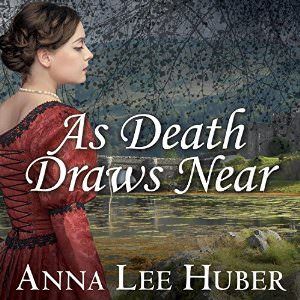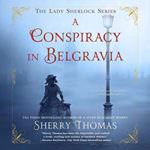 Narrated by Heather Wilds
Narrated by Heather Wilds
This fifth book in Anna Lee Huber’s series of historical mysteries featuring Lady Keira Darby is another well-constructed tale – one in which Keira and her new husband, inquiry agent Sebastian Gage, are asked to investigate the murder of an Irish nun.
The newly-weds are on their honeymoon when an urgent letter from Sebastian’s father, Lord Gage, reaches them, informing them that a young woman –a relative of the Duke of Wellington – has been found dead on the grounds of Loretto Abbey near Rathfarnham where she was a postulant. Seeing as Gage and Keira are in the north of England and can more easily travel to Ireland, Lord Gage asks them to look into the matter in his stead. Gage’s relationship with his overbearing father is strained to say the least, and has become moreso since he refused to marry the debutante chosen for him and married Keira, a widow dogged by scandal (The Anatomist’s Wife). They have half a mind to refuse the request, but fearing that Lord Gage would simply rush the inquiry and would more than likely not be impartial, they decide to go and do their best to obtain justice for the dead woman.
Accompanied by Keira’s maid, Bree, and Gage’s valet, Anderley, the couple travels to Ireland and are surprised to encounter the Marquess of Marsdale along the way. He’s a bit of a rogue, not known for taking things seriously and tells them that he’s left London to avoid being forced to marry a young woman he’s been accused of compromising. Keira and Gage are suspicious, but accept his story, although it soon becomes clear that he is more interested in the reasons for their visit than he has let on.
Keira and Gage are welcomed at the Abbey, but Keira is surprised at the hostility and mistrust they encounter elsewhere. Ms. Huber has done a terrific job in this book of exploring the incredibly complex and fraught historical background of the religious tensions in Ireland – which still exist today – between the ruling Protestants and the Catholic majority. The Catholic Relief Act of 1829, the culmination of a series of laws resulting in Catholic emancipation in Britain have done very little to relieve the problems faced by the ordinary, working people in Ireland, who are forced to pay tithes to the Church of Ireland (the Protestant churches) regardless of their religious affiliation.
With all that tension in the background, the Gages find their investigation hampered on all sides. The dead young woman – Miss Lennox – was a Catholic convert, so the local Protestants don’t think her death is worth investigating, and the local Catholics are suspicious of the Protestants who have been sent to investigate it. Carefully and patiently, Keira and Gage begin to gather information, but when another nun is murdered, things become increasingly difficult and dangerous, people clam up even more and it seems as though they are at a dead end.
I’m not going to say any more about the plot, save to say that there’s a great last-minute twist I definitely didn’t see coming which puts the whole mystery into a different light.
The other strengths of the book – as has been the case with the others in the series – are the continually evolving relationship between Keira and Gage, and Keira’s continuing personal growth. In the first book (The Anatomist’s Wife), she had recently emerged from marriage to a husband who mistreated her and she wanted nothing more than to fade into the background. As the series has progressed, she has become gradually more confident in herself and her abilities, but her recent marriage to the man she loves wholeheartedly means she has a new set of challenges to face. Gage has great respect and admiration for Keira’s intellect and instincts, but even before they married, his natural protective instincts were the cause of some friction between them. One of the things I really like about their relationship is that Gage knows he can be overprotective and tries not to be – but at the end of the day, he can’t help wanting to keep his wife safe from harm.
But Keira is now questioning herself – should she be spending her time examining murder scenes and dead bodies? What happens when they have children? She has a rather lovely conversation with the Abbess which helps her to see her situation in a different light, and, towards the end, one with Gage in which she expresses her concerns and which shows the strength of their love for and belief in each other, and it’s very touching.
I’ve read and enjoyed all the books in this series, but have only listened to one, the first – The Anatomist’s Wife, which I reviewed here – and I didn’t enjoy the narration as much as I’d expected to (I gave it a C+). Heather Wilds is someone I listen to fairly frequently and to whom I have given fairly high grades for other performances, but that book really exposed her difficulty in adopting and sustaining a decent Scottish accent. As a consequence, I found myself frequently taken out of the story and wondering what the good people at Tantor Audio were doing, assigning a narrator who couldn’t do a good Scottish accent to a set of stories set in Scotland! I decided to stick to print for this series, but as we’re now at the fifth book, I thought I’d try again. Plus, this story is set in Ireland, and I thought to listen to Ms. Wilds have a stab at doing a decent Irish accent instead.
Well, I’d be lying if I said I didn’t have mixed feelings. On a positive note, Ms. Wilds’ overall performance is accomplished, her pacing is good and her enunciation is clear and, apart from a couple of mispronunciations, precise. She differentiates well between all the characters, and I like the edge she adds to her tone to portray Gage, which makes him sound both authoritative and attractive. In this story, the only character with a Scottish accent is Bree, the maid, and taken on its own, it’s fine; it’s consistent, mostly accurate and doesn’t slip. The Irish accents – while mostly okay – are problematic, but it’s not all the narrator’s fault. Readers of highland-set romances are often faced with texts littered with attempts to render the Scottish brogue accurately on the page, so we get lots of “dinna”s and “verra”s and “ye”s and lots of other strange spellings! For the Irish characters, Ms. Huber has opted to indicate their manner of speech by frequently replacing the letters “th” with “d”, so “that” becomes “dat” and “them” becomes “dem”, or with a “t”, so that “thing becomes “ting”, etc. Personally, I’m not fond of either tactic – I prefer to hear the accents in my head as I read a book and find those methods of conveying them annoying. The problem here is that although Ms. Wilds is duly following the text in her performance, the frequency with which the “dat”s and “dem”s appear makes the accent sound overly contrived and false. She does perform the Irish lilt quite well, but the continual intrusion of the hard “d” is jarring.
Taken as a whole, As Death Draws Near is a bit of a mixed bag. The story is intriguing and clearly well-researched, and although it is a little slow to start, the strong characterisations and later plot developments make up for it. The narration, while decent, isn’t problem-free, and is still subject to Ms. Wild’s idiosyncratic breathing patterns and intonation, things I and my fellow reviewers have pointed out in other reviews of her work. I’m recommending the audiobook for the strength of the story and with those reservations about the narration; others who are not as picky as I am about accents may enjoy it more.
Caz
Narration: B
Book Content: B+
Steam Factor: You can play it out loud
Violence Rating: Minimal
Genre: Historical Mystery
Publisher: Tantor Audio
As Death Draws Near was provided to AudioGals by Tantor Audio for a review.




Great review Caz!
I doubt I will listen to this though, the “dats” and “dems” were annoying enough in print, to have to listen to them for hours would drive me nuts. Huber’s editor should be spanked!
I really love this series, Huber has framed a great partnership between Keira and Gage, they keep evolving as a couple and unlike so many other series’ couples they haven’t become stagnant. I loved the honeymoon part of the story, like them I hated to leave the idyllic Lake District for Ireland. I’ve spent time there when the weather was spectacular….I have fond memories of that holiday.
As Death Draws Near is a very good mystery and the historical information was terrific! I appreciated the way she laid it all out for the reader in a non-preachy way. Good book, but Huber never stumps me, I always figure it out and in this one I knew the twist was coming early on, the hints were like a loud PSST!
I’m crap at figuring out whodunnit most of the time, so I thought the twist in this was really well done!
Some narrators will do their own thing when it comes to written (or not) accents. I mentioned in my review of The Rogue You Know that while Shana Galen hadn’t written the hero’s cockney dialect, the narrator put it in anyway, which was a valid acting choice. Some narrators opt to perform “written out dialect” in a more natural manner than it can ever be written down. Had Ms. Wilds done that, and softened the “d” as is actually what you would hear from someone with that sort of accent, then it might not have been so obtrusive.
I know written out dialects really annoy some people; I don’t get too bent out of shape over it, but I do think that narrators should ignore it and perform accents as they really sound rather than trying to incorporate the written out stuff which can rarely get it right as we don’t write using the phonetic alphabet à la Henry Higgins!